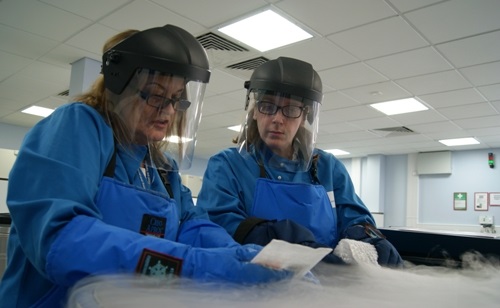NHS Blood and Transplant will start producing stem cells for groundbreaking treatment aimed at combating one of the most serious health problems facing the NHS, diabetic kidney disease.

Maria Houlton and Danielle Withey checking frozen stem cell samples at NHSBT Liverpool
The disease is a major cause of sickness and death in the EU. There are 2.7 million people diagnosed with diabetes in England, a number that is increasing by about 5% per year.
NHS Blood and Transplant will produce a special type of stem cell, known as stromal stem cells, for administration to diabetic patients in England and Northern Ireland who are taking part in an international clinical trial. NHS Blood and Transplant will use a bioreactor at its Liverpool site to expand samples of around 20m stromal cells up to around 800m cells, ready for use in patients.
Stromal stem cells can differentiate into a variety of connective cell types – for example bone cells, cartilage cells, and fat cells. However, they also have the ability to help regulate the body’s immune responses.
Specific doses of stromal cells will be injected into the bloodstream of diabetic patients to try and slow down or stop the progression of diabetic kidney disease by better regulating the body’s response. Diabetic patients have high levels of blood sugar, which can lead to a series of reactions that cause the body to reduce blood supply to the kidney, killing off kidney tissue.
The UK patients taking part in the trial will be treated University Hospitals Birmingham NHS Foundation Trust and Belfast Health and Social Care Trust. The first training runs for stem cell production in Liverpool are due to start this month, October. The first treatments are due in 2016.
Dr Eric Austin, head of Stem Cell Immunotherapy at the Advanced Therapy Unit within the Stem Cells and Immunotherapies department at NHS Blood and Transplant’s site in Speke, Liverpool, said:
This is an exciting project for us to be involved with – especially as the treatment has the potential to lead to life saving outcomes for a major illness. We will be using NHS Blood and Transplant’s expertise in cellular and molecular therapy - and our extensive scientific and transport network – to play a key role in this international trial.
The research project, called NEPHSTROM, is led by the National University of Ireland, Galway, and Orbsen Therapeutics, an NUI Galway spin out company. The project has been funded with six million Euros from the European Union Horizon 2020 programme.
Professor Timothy O’Brien, the project leader, and director of the Regenerative Medicine Institute (REMEDI) at the National University of Ireland Galway, said:
If predictions prove correct, then our healthcare systems are facing a huge task in managing the complications caused by ever-increasing numbers of patients with diabetes mellitus.
Chief among such complications will be kidney disease, which has a huge financial cost in terms of current treatments, and takes a massive personal toll on patients. Diabetes is currently the most common cause of end stage kidney disease resulting in the need for dialysis or transplantation. We are confident that by harnessing the most modern approaches in stromal cell therapeutics there may well be a way to halt the progression of diabetic kidney disease using this therapy.
The results will be measured in terms of improvements in kidney performance as measured by urine and blood samples. If successful, the researchers will see the disease significantly slowed or halted altogether.
Professor Giuseppe Remuzzi, from the Istituto Di Ricerche Farmacologiche Mario Negri in Italy will lead the clinical trial across the four centres. He said:
The clinical experience with stromal cells is still in its infancy, mainly focused on developing novel therapeutic solutions for patients with bone marrow or organ transplantation as well as for those with a small number of autoimmune diseases. NEPHSTROM is a small but intensively studied clinical trial which will allow determination of the effective dose, and how they might function to protect the diabetic kidney.
Source: http://www.nhsbt.nhs.uk/